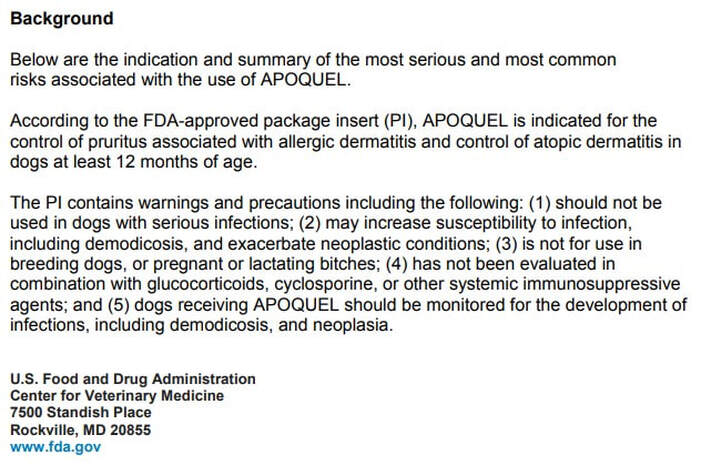Avoid APOQUEL. It's a very dangerous drug.

By Natural Dog Health Remedies
Allergies that commonly affect dogs include dog skin allergies (canine atopic dermatitis), dog flea allergies (flea allergy dermatitis), contact dermatitis, and dog food allergies. More and more dogs are developing some form of allergies these days. It is therefore essential that dog parents learn about the different forms of canine allergies; why dogs develop allergy symptoms; and more.
Is your dog constantly scratching, chewing, and licking? If so, there is a possibility that he may be suffering from some form of allergy.
Allergies that commonly affect dogs include dog skin allergies (canine atopic dermatitis), dog flea allergies (flea allergy dermatitis), contact dermatitis, and dog food allergies. More and more dogs are developing some form of allergies these days. It is therefore essential that dog parents learn about the different forms of canine allergies; why dogs develop allergy symptoms; and more.
Is your dog constantly scratching, chewing, and licking? If so, there is a possibility that he may be suffering from some form of allergy.
In recent years, the number of dogs suffering from dog allergies has increased dramatically. At the same time, many dogs have been mis-diagnosed as having allergies when in fact they are suffering from something else. For example, dogs suffering from hypothyroidism frequently have skin infections which are often misdiagnosed as canine atopic dermatitis. Because of the misdiagnosis, they are being put on the wrong medication (usually corticosteroids) and sometimes suffer from side effects of such medication.
A proper diagnosis is therefore very important before any treatment is given to our dogs.
It is equally extremely important that we dog parents educate ourselves as much as we can about canine allergies as they seem to affect our dogs more frequently now than before.
What are "Canine Allergies"?
Canine allergies are basically symptoms manifested as a result of a dog's immune system working hard to get rid of outside substances. These substances - allergens - can be anything (natural or artificial, organic or inorganic), and they can be found in a lot of places and things, such as food, in our homes, and in the environment. They can cause allergic reactions after being ingested, inhaled or absorbed.
Usually, canine allergies are manifested in three ways. The most common is itching and inflammation of the skin which can either be limited to one area (localized) or all over the body (generalized). Another manifestation involves the respiratory system and may result in coughing, sneezing, and/or wheezing. Nasal and/or eye discharge may also be present. Finally, sometimes dog allergies involve the digestive system, resulting in vomiting or diarrhea.
It is equally extremely important that we dog parents educate ourselves as much as we can about canine allergies as they seem to affect our dogs more frequently now than before.
What are "Canine Allergies"?
Canine allergies are basically symptoms manifested as a result of a dog's immune system working hard to get rid of outside substances. These substances - allergens - can be anything (natural or artificial, organic or inorganic), and they can be found in a lot of places and things, such as food, in our homes, and in the environment. They can cause allergic reactions after being ingested, inhaled or absorbed.
Usually, canine allergies are manifested in three ways. The most common is itching and inflammation of the skin which can either be limited to one area (localized) or all over the body (generalized). Another manifestation involves the respiratory system and may result in coughing, sneezing, and/or wheezing. Nasal and/or eye discharge may also be present. Finally, sometimes dog allergies involve the digestive system, resulting in vomiting or diarrhea.
|
Why do Some Dogs Get Allergies While Others Don't?
Allergies in dogs come, first and foremost, from the "inside", rather than from outside allergens. These days dogs are exposed to a lot of allergens. However, not all dogs develop symptoms of allergies. Those who do are often pets with problems from the "inside", for example, dogs with an already weakened immune system, hormonal imbalance, bacterial or fungal infections, or those with emotional stress due to boredom, a lack of exercise, etc. When exposed to outside allergy-causing factors, (such as fleas, poor quality food, environmental toxins, over vaccination), these dogs are more prone to develop symptoms of dog allergies. |
If your pet shows dog allergy symptoms, it is very important that you consult your vet and ask that a thorough check-up (skin and blood tests) be carried out to identify the "inside" cause of the allergy. Finding out the inside "root" problem and getting rid of that problem will strengthen the overall health of your dog, making her more resistant against the outside allergens.
How do Allergy Symptoms Develop?
The hallmark symptoms of common dog allergies include itchiness and inflammation of the skin. These symptoms occur when the dog's allergen-specific IgE antiboides release some chemicals that cause the symptoms. The exact mechanism is rather complex. Here is a simplified explanation:
When a dog is exposed to an allergen (e.g. fleas, pollen), IgE antibodies are formed by the dog's white blood cells. The IgE antibody attaches to a mast cell (mast cells are important tissue cells that form part of the immune system). The next time the dog is exposed to the allergen, the allergen attaches to the IgE antibody-mast cell combination. When that happens, the mast cell sort of "explodes" and releases chemicals within the cell and cell membrane. These chemicals include, among others, histamine and various prostaglandins which are responsible for causing the clinical signs of common dog allergies including itching and inflammation.
How do Allergy Symptoms Develop?
The hallmark symptoms of common dog allergies include itchiness and inflammation of the skin. These symptoms occur when the dog's allergen-specific IgE antiboides release some chemicals that cause the symptoms. The exact mechanism is rather complex. Here is a simplified explanation:
When a dog is exposed to an allergen (e.g. fleas, pollen), IgE antibodies are formed by the dog's white blood cells. The IgE antibody attaches to a mast cell (mast cells are important tissue cells that form part of the immune system). The next time the dog is exposed to the allergen, the allergen attaches to the IgE antibody-mast cell combination. When that happens, the mast cell sort of "explodes" and releases chemicals within the cell and cell membrane. These chemicals include, among others, histamine and various prostaglandins which are responsible for causing the clinical signs of common dog allergies including itching and inflammation.
What are Some Common Dog Allergies?
Common dog allergies include: Canine Atopic Dermatitis One of the most common dog allergies is canine atopic dermatitis, aka canine atopy. Canine atopic dermatitis is a genetic inflammatory skin disorder, in which the dog becomes sensitized to environmental allergens (such as pollens, molds, house dust mites, etc.) Depending on the allergens, canine atopy can be seasonal (e.g. pollen allergies) or it can be year round (e.g. house dust mites, molds, etc.) Allergies usually occur within 1 to 3 years of a dog being exposed to continual environmental allergens.
Common dog allergies include: Canine Atopic Dermatitis One of the most common dog allergies is canine atopic dermatitis, aka canine atopy. Canine atopic dermatitis is a genetic inflammatory skin disorder, in which the dog becomes sensitized to environmental allergens (such as pollens, molds, house dust mites, etc.) Depending on the allergens, canine atopy can be seasonal (e.g. pollen allergies) or it can be year round (e.g. house dust mites, molds, etc.) Allergies usually occur within 1 to 3 years of a dog being exposed to continual environmental allergens.
Dog Flea Allergies
Flea allergy dermatitis, aka dog flea allergies, used to be one of the most common dog allergies. However, with more flea control products available to dog parents, the incidence of flea allergies in dogs has decreased substantially. The cause of flea allergy dermatitis is the saliva of the flea which contains a number of chemicals that can induce an allergic response in dogs.
Flea allergy dermatitis, aka dog flea allergies, used to be one of the most common dog allergies. However, with more flea control products available to dog parents, the incidence of flea allergies in dogs has decreased substantially. The cause of flea allergy dermatitis is the saliva of the flea which contains a number of chemicals that can induce an allergic response in dogs.
Dog Food Allergies
Compared to canine atopy and flea dermatitis, true food allergies in dogs are rather rare, accounting for less than 10 percent of cases referred to veterinarians. Canine food allergies result when a dog develops allergic reactions to one or more ingredients in his food. It causes intense itching to the allergic dog. Suspect dog food allergies if your dog shows allergy symptoms all year round and does not respond to anti-inflammatory and anti-itching medications such as corticosteroids. To diagnose dog food allergies, you need to feed your dog an "elimination diet", the purpose of which is to ban all protein that the dog has eaten before in order to isolate and identify the allergen.
Contact Dermatitis
Contact dermatitis is rare in dogs and is caused by direct skin contact with an allergen. Contact dermatitis usually causes sudden onset of skin reactions such as itching, rashes, and hair loss. Common culprits that may cause contact dermatitis in dogs are chemicals found in some flea collars, soaps and disinfectants, weed killer, fertilizers, and insecticides. If your dog shows symptoms such as hair loss, redness, and/or inflammation around the neck shortly after beginning to wear a flea collar, chances are she is allergic to the collar. Soaps and gardening chemicals can cause allergic reactions on the skin that can easily contact the ground, such as the "armpits", and the stomach and groin areas. Sometimes, the dog may also develop mouth lesions if she licks the affected areas.
Compared to canine atopy and flea dermatitis, true food allergies in dogs are rather rare, accounting for less than 10 percent of cases referred to veterinarians. Canine food allergies result when a dog develops allergic reactions to one or more ingredients in his food. It causes intense itching to the allergic dog. Suspect dog food allergies if your dog shows allergy symptoms all year round and does not respond to anti-inflammatory and anti-itching medications such as corticosteroids. To diagnose dog food allergies, you need to feed your dog an "elimination diet", the purpose of which is to ban all protein that the dog has eaten before in order to isolate and identify the allergen.
Contact Dermatitis
Contact dermatitis is rare in dogs and is caused by direct skin contact with an allergen. Contact dermatitis usually causes sudden onset of skin reactions such as itching, rashes, and hair loss. Common culprits that may cause contact dermatitis in dogs are chemicals found in some flea collars, soaps and disinfectants, weed killer, fertilizers, and insecticides. If your dog shows symptoms such as hair loss, redness, and/or inflammation around the neck shortly after beginning to wear a flea collar, chances are she is allergic to the collar. Soaps and gardening chemicals can cause allergic reactions on the skin that can easily contact the ground, such as the "armpits", and the stomach and groin areas. Sometimes, the dog may also develop mouth lesions if she licks the affected areas.
Whats Next?
By Holistic And Organix Pet Shoppe
Now that you have learned why allergies occur, what are you going to do to rid of them? First off, eliminate all chemicals. This includes laundry soaps, use chemical free fabric softener sheets. Use organic all natural lawn fertilizers, no weed killers or bug sprays. Do not use ANY flea and tick medications you buy from your vet or from a pharmacy. Even the OTC junk you buy in stores is VERY toxic. I have seen many deaths from these as well. Use all natural treatments.
Do NOT vaccinate your pets yearly. It is NOT needed. Rabies (BY LAW) is to be given every 3 years. Make sure your Vet is on the same page as this and force pet parents to do the 1 yr vaccine. If he/she does, FIND A NEW VET. Ask for the Thimerosol FREE vaccine. I recommend titer testing for the other vaccines (distemper etc). If your Vet charges outrageous prices for titers, have him/her look into Vaccicheck. It's much cheaper.
For heartworm treatments or preventatives, use the all natural solutions. Also add grasses that deter mosquitoes and insects. (Lavender, lemongrass, mint leaves etc) For application for yard and to be added into foods, use Diatomaceous Earth (FOOD GRADE).
Now that you have learned why allergies occur, what are you going to do to rid of them? First off, eliminate all chemicals. This includes laundry soaps, use chemical free fabric softener sheets. Use organic all natural lawn fertilizers, no weed killers or bug sprays. Do not use ANY flea and tick medications you buy from your vet or from a pharmacy. Even the OTC junk you buy in stores is VERY toxic. I have seen many deaths from these as well. Use all natural treatments.
Do NOT vaccinate your pets yearly. It is NOT needed. Rabies (BY LAW) is to be given every 3 years. Make sure your Vet is on the same page as this and force pet parents to do the 1 yr vaccine. If he/she does, FIND A NEW VET. Ask for the Thimerosol FREE vaccine. I recommend titer testing for the other vaccines (distemper etc). If your Vet charges outrageous prices for titers, have him/her look into Vaccicheck. It's much cheaper.
For heartworm treatments or preventatives, use the all natural solutions. Also add grasses that deter mosquitoes and insects. (Lavender, lemongrass, mint leaves etc) For application for yard and to be added into foods, use Diatomaceous Earth (FOOD GRADE).
Stay completely away from grocery store or dept store pet treats and foods. They are the worst. LEARN to read ingredients. Here is a list you can even print out to learn a few.
And when it comes to pet foods, they are the number one problem in skin allergies. These contain so many chemicals, synthetic vitamins, and the 4 Ds. All of which can make your pet sick. Maybe not for awhile but eventually. Look into feeding a species appropriate diet. If you want results, you must makes these changes. Commercial pet foods are the lowest quality ingredients on our planet. All of the waste from grocery stores, animal shelters etc is made into pet food. Even plastic wrappers are thrown in. Everything including the kitchen sink. So your best bet is to steer completely away from pet foods. Feed a homemade diet with the much recommended supplements to help protect your dogs joints, organs and skin. If you want your pet to live a longer healthier life, this is the only way to go. There are MANY dogs that have had allergies to pet foods say..chicken..and the pet parent was unable to feed chicken to their dog due to issues. BUT many times when fed a raw diet, these allergies do not show up at all and therefor means the dog is NOT and never was allergic to chicken. It was the commercial pet food and the way its processed that has caused the issue. Kibble is sprayed with old restaurant grease for taste as well. Who knows whats in that mix!
And when it comes to pet foods, they are the number one problem in skin allergies. These contain so many chemicals, synthetic vitamins, and the 4 Ds. All of which can make your pet sick. Maybe not for awhile but eventually. Look into feeding a species appropriate diet. If you want results, you must makes these changes. Commercial pet foods are the lowest quality ingredients on our planet. All of the waste from grocery stores, animal shelters etc is made into pet food. Even plastic wrappers are thrown in. Everything including the kitchen sink. So your best bet is to steer completely away from pet foods. Feed a homemade diet with the much recommended supplements to help protect your dogs joints, organs and skin. If you want your pet to live a longer healthier life, this is the only way to go. There are MANY dogs that have had allergies to pet foods say..chicken..and the pet parent was unable to feed chicken to their dog due to issues. BUT many times when fed a raw diet, these allergies do not show up at all and therefor means the dog is NOT and never was allergic to chicken. It was the commercial pet food and the way its processed that has caused the issue. Kibble is sprayed with old restaurant grease for taste as well. Who knows whats in that mix!
Giving a dog steroids constantly WILL shorten your dogs life. It is doing extensive damage to the organs every day these are used. DO NOT use these long term (over 2-3 weeks max) or regularly. Steroids are a band-aid in a pill or injection form. They are not the solution.
Once you make a diet change, you will need to help detox the body. You will need to use supplements to do this. Milk thistle to start. Milk thistle cleanses the liver and helps to repair any damage done to it. It is the only organ that can repair itself. Then add in the recommended supplements.
If your dog has a sensitive stomach or intestinal tract, add slippery elm daily to help coat the lining of the tract.
Until you make these changes, your dog will only get worse or die at a younger age than necessary. It is inevitable that when all of these toxins enter the body that it eventually will give up and shut down. So start immediately and make these changes..not only for your dog but for your health as well. And also if you smoke, do NOT smoke any where around your pets at all. Take it outside! They cant tell you that so I am.
Holistic And Organix Pet Shoppe ©
Once you make a diet change, you will need to help detox the body. You will need to use supplements to do this. Milk thistle to start. Milk thistle cleanses the liver and helps to repair any damage done to it. It is the only organ that can repair itself. Then add in the recommended supplements.
If your dog has a sensitive stomach or intestinal tract, add slippery elm daily to help coat the lining of the tract.
Until you make these changes, your dog will only get worse or die at a younger age than necessary. It is inevitable that when all of these toxins enter the body that it eventually will give up and shut down. So start immediately and make these changes..not only for your dog but for your health as well. And also if you smoke, do NOT smoke any where around your pets at all. Take it outside! They cant tell you that so I am.
Holistic And Organix Pet Shoppe ©




















